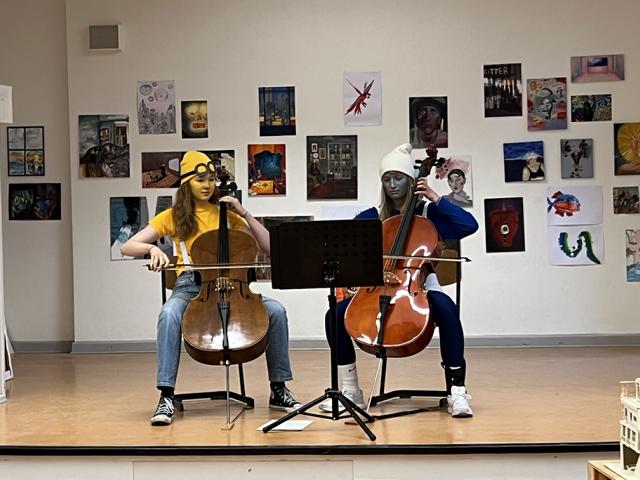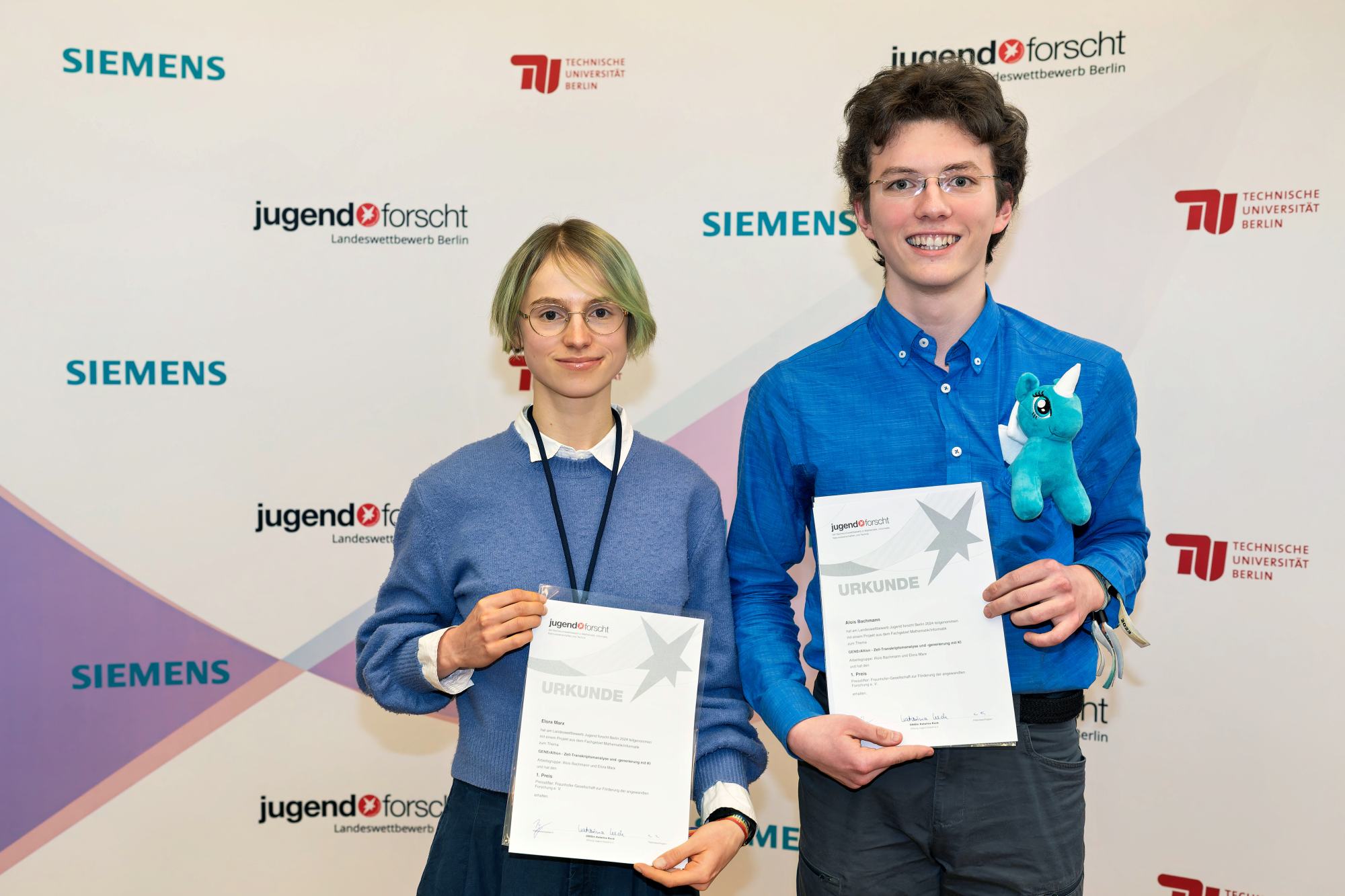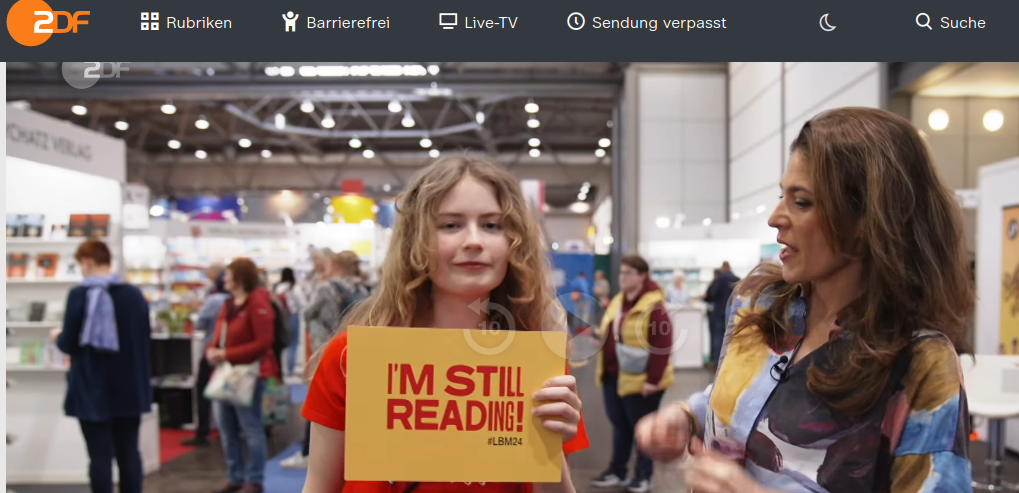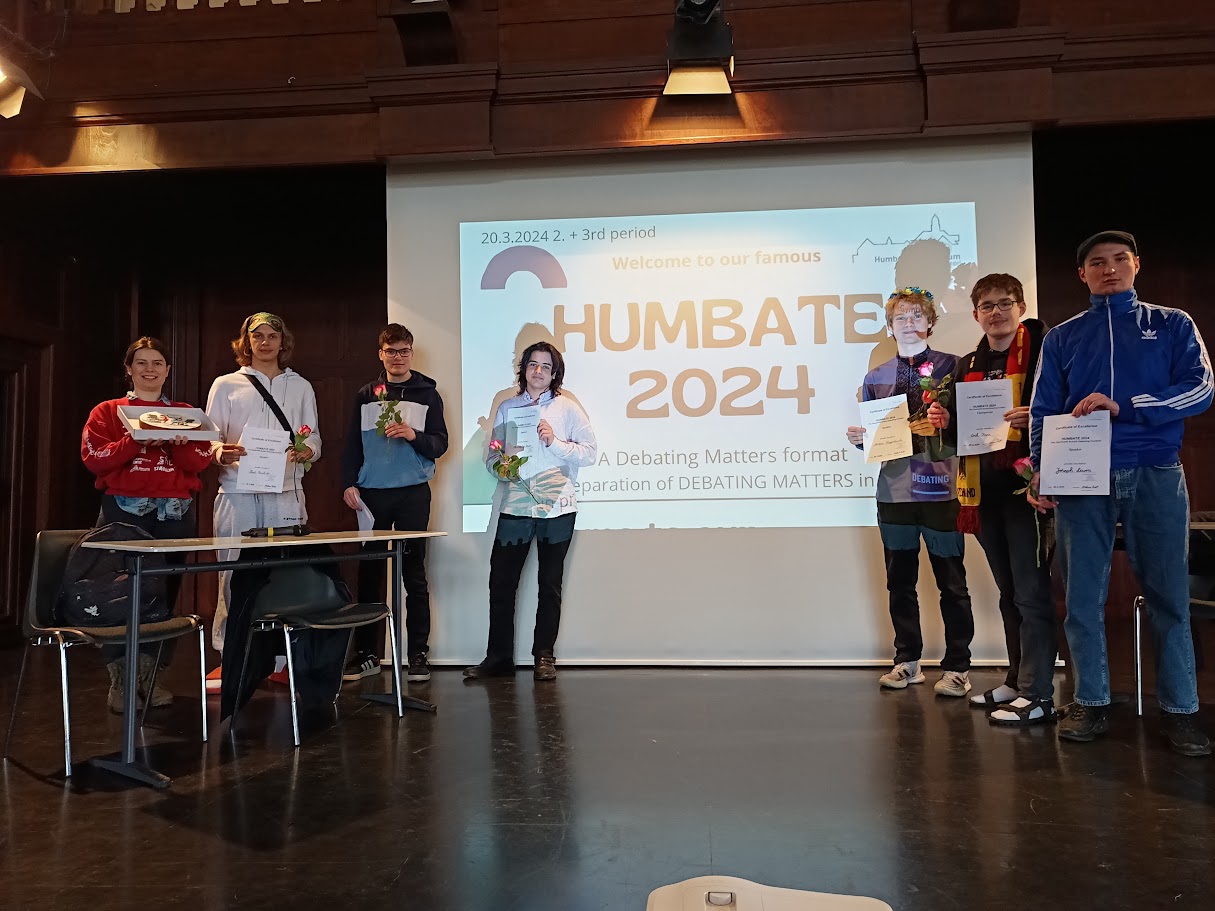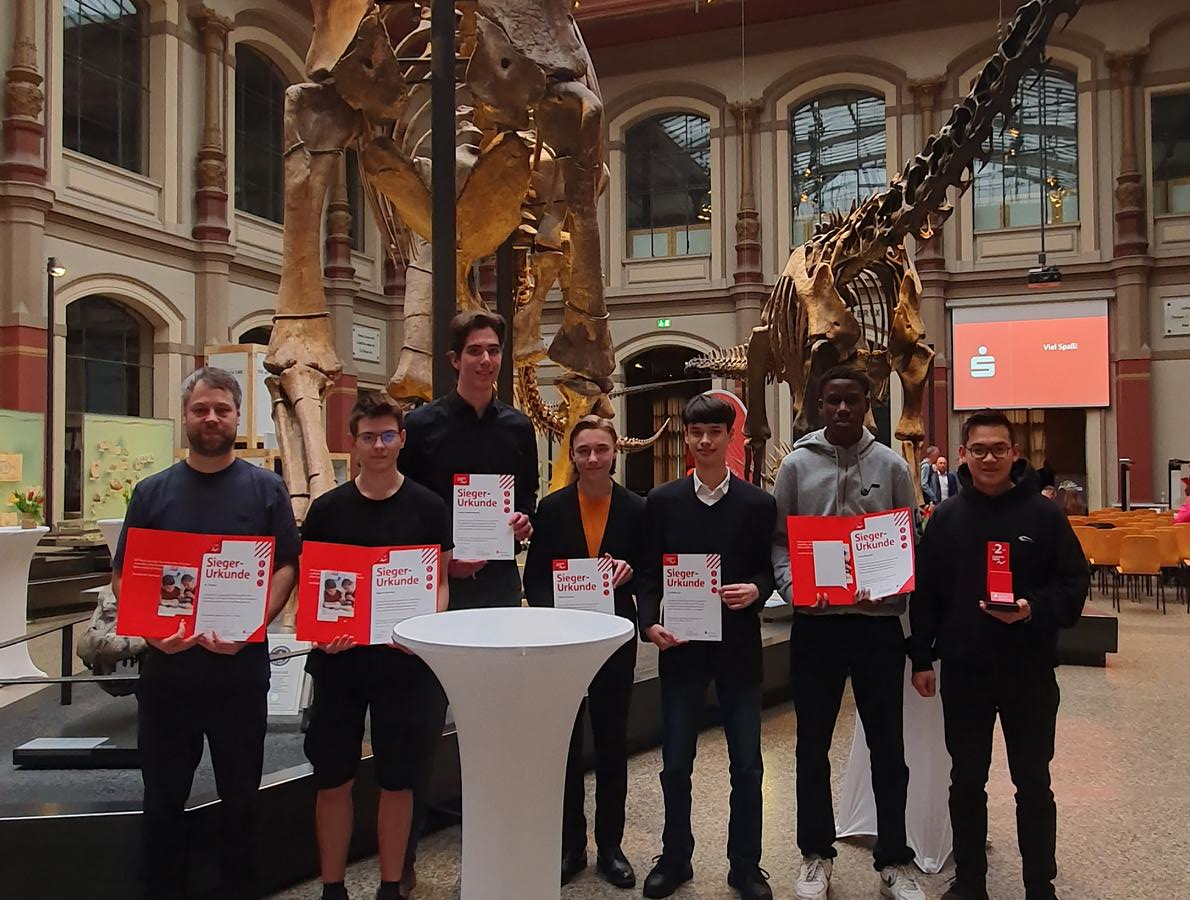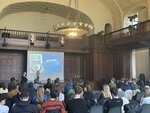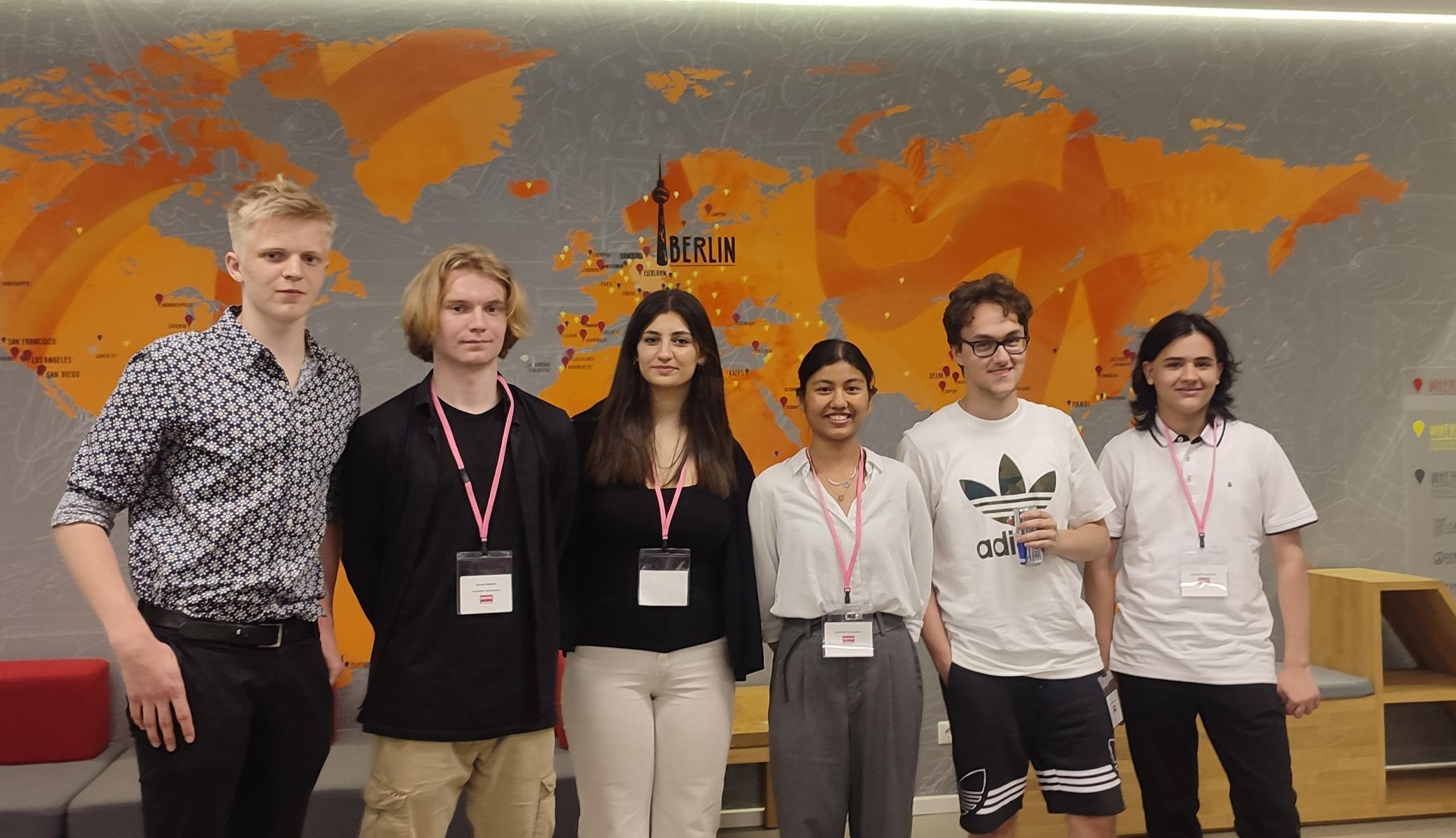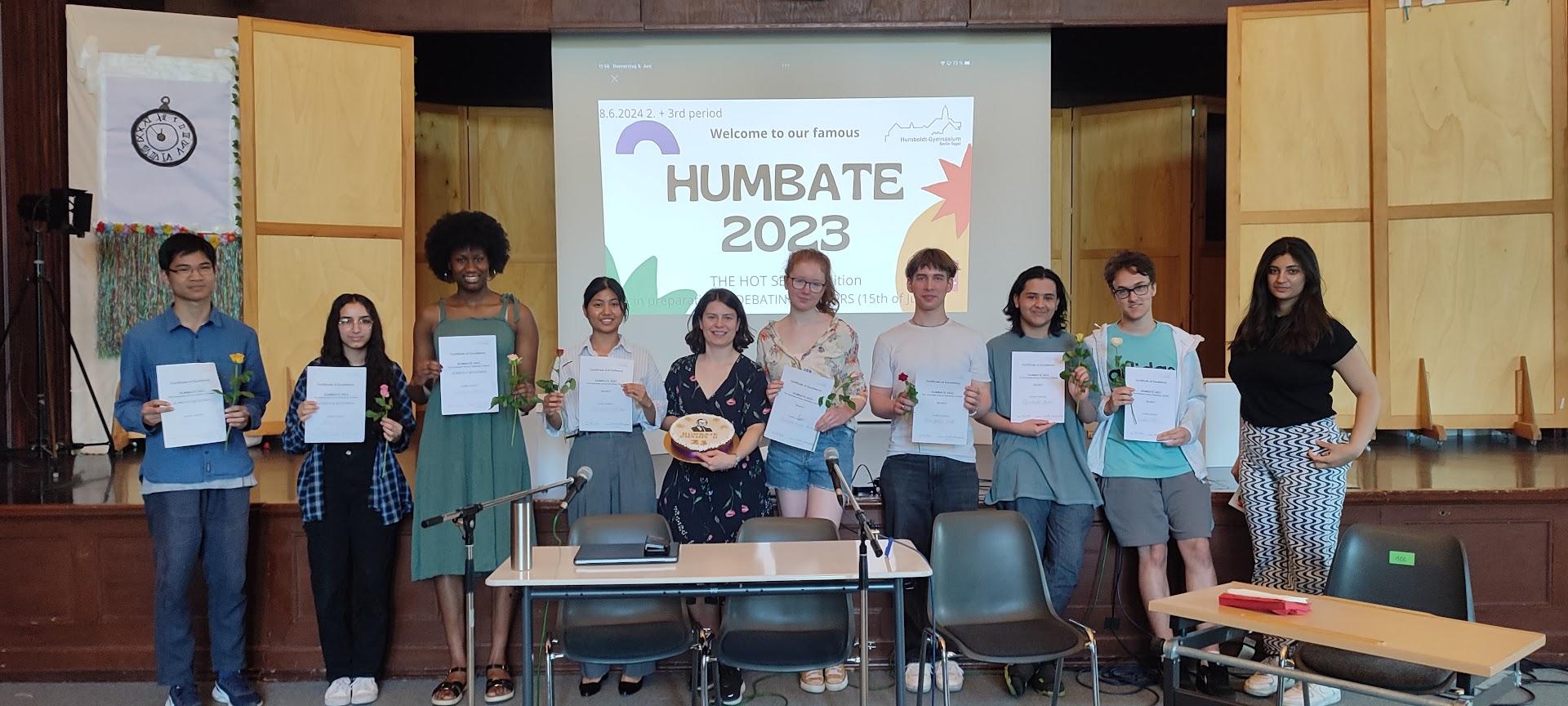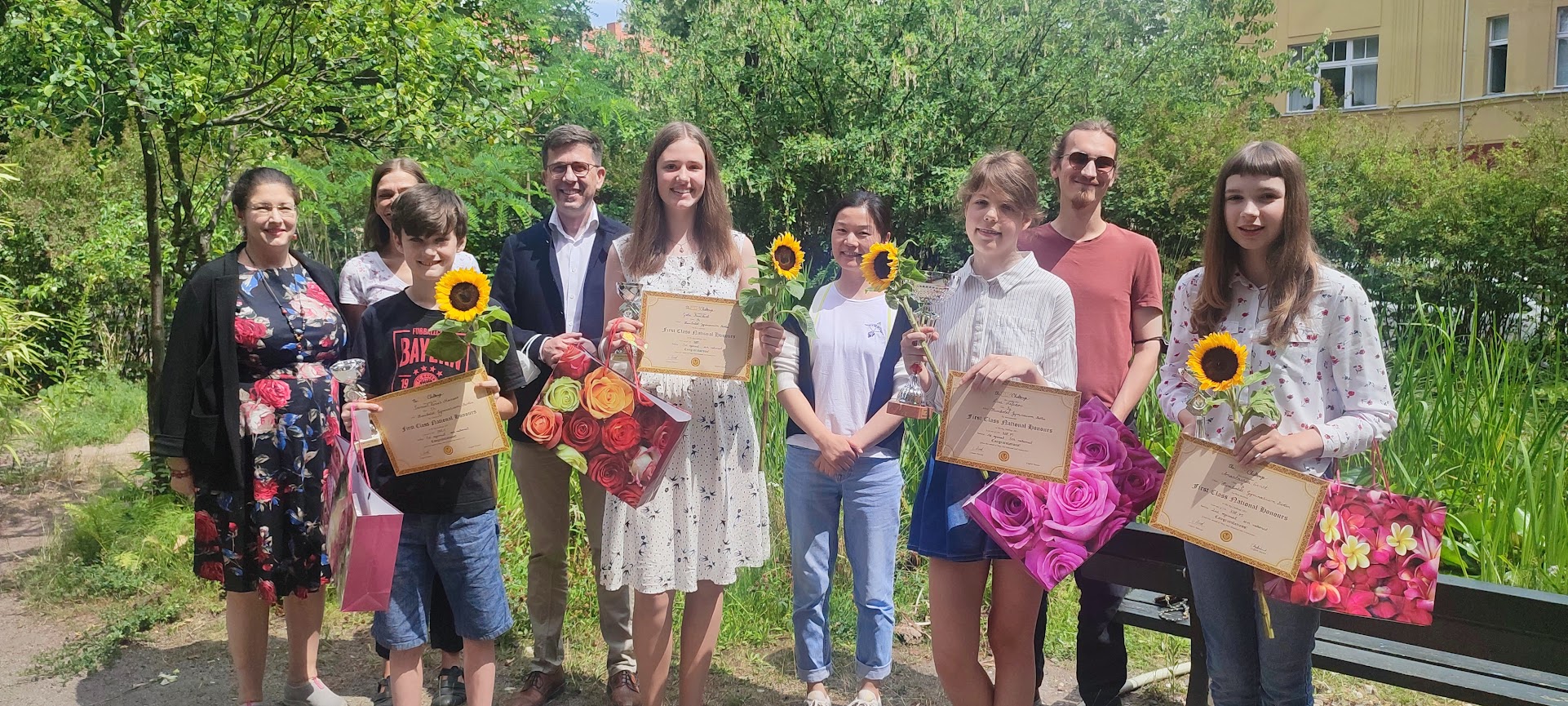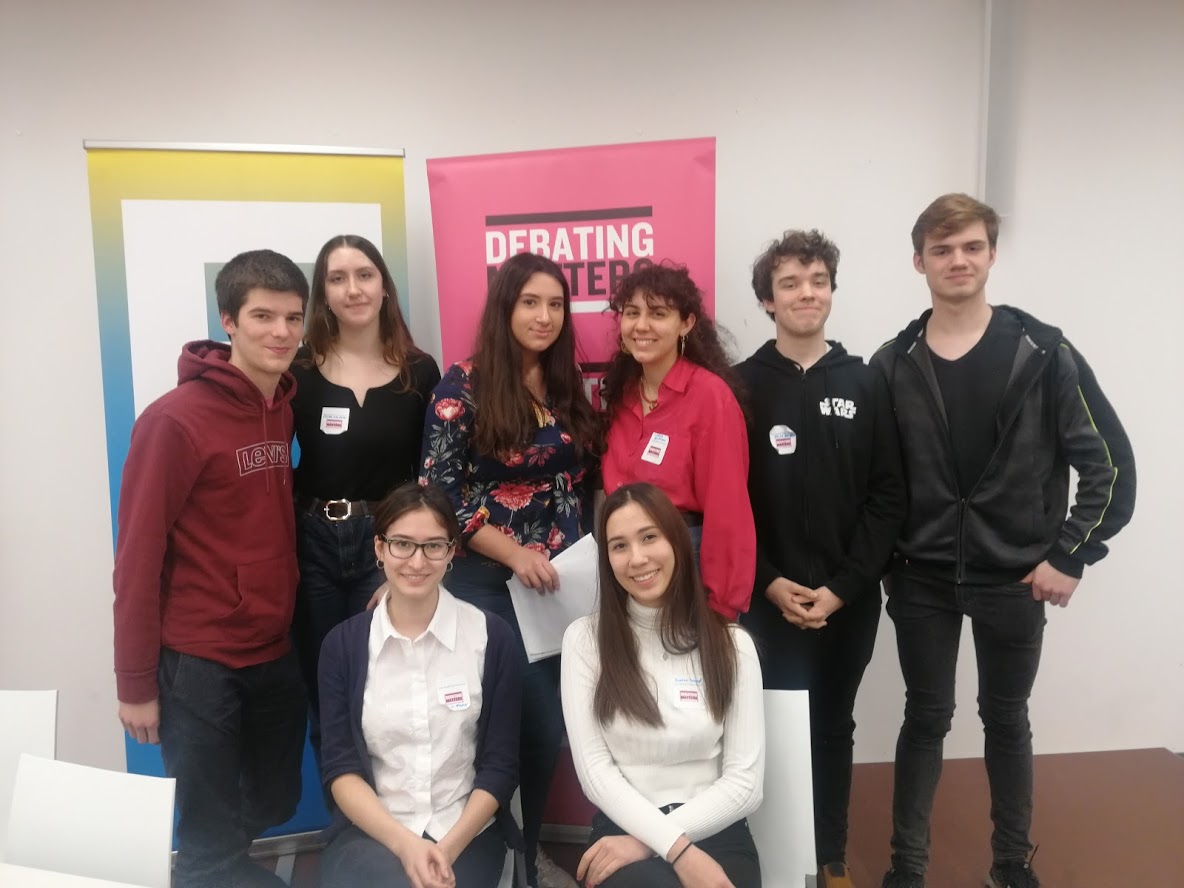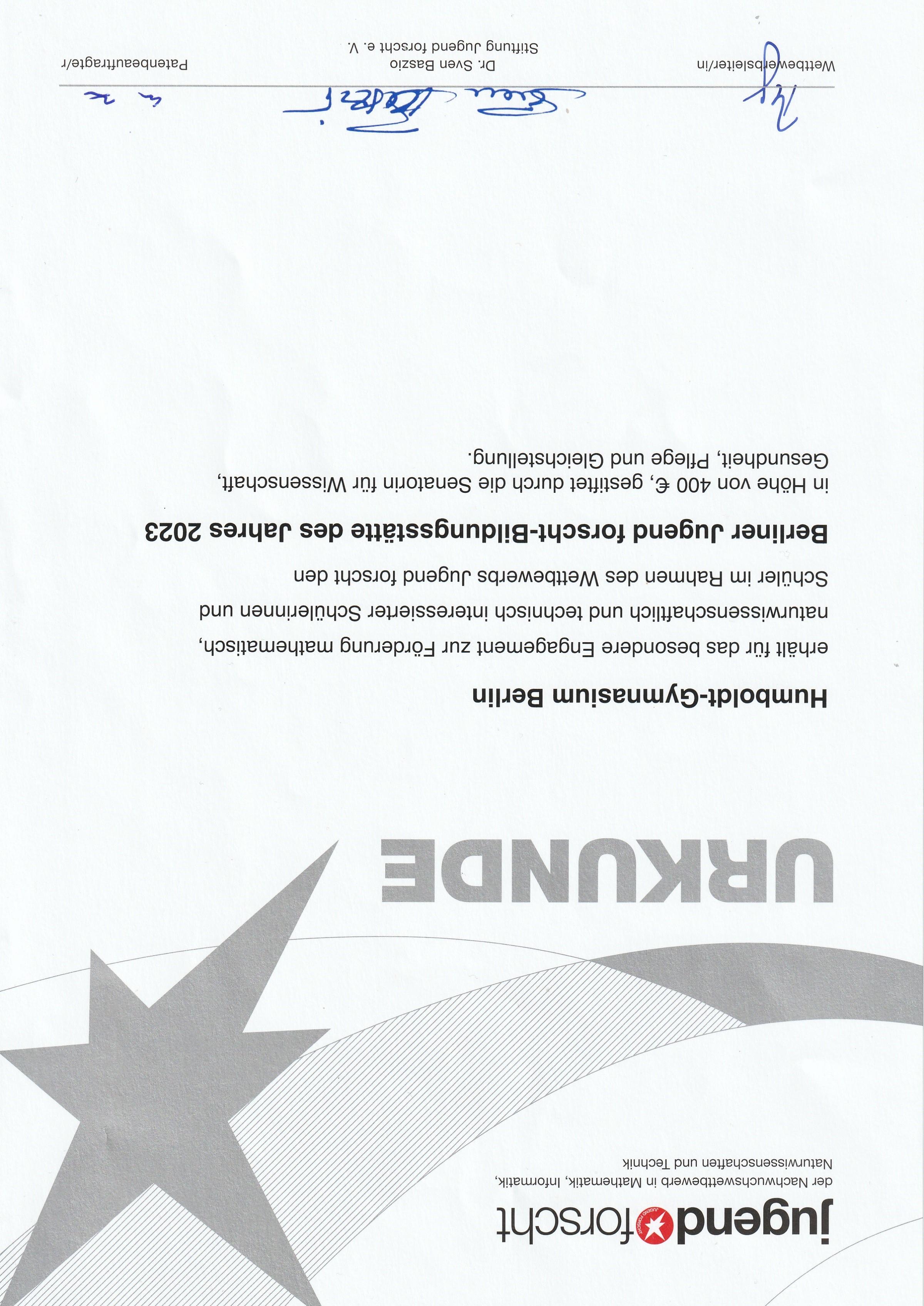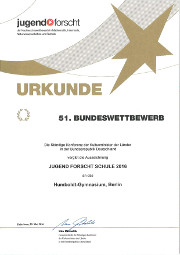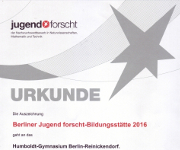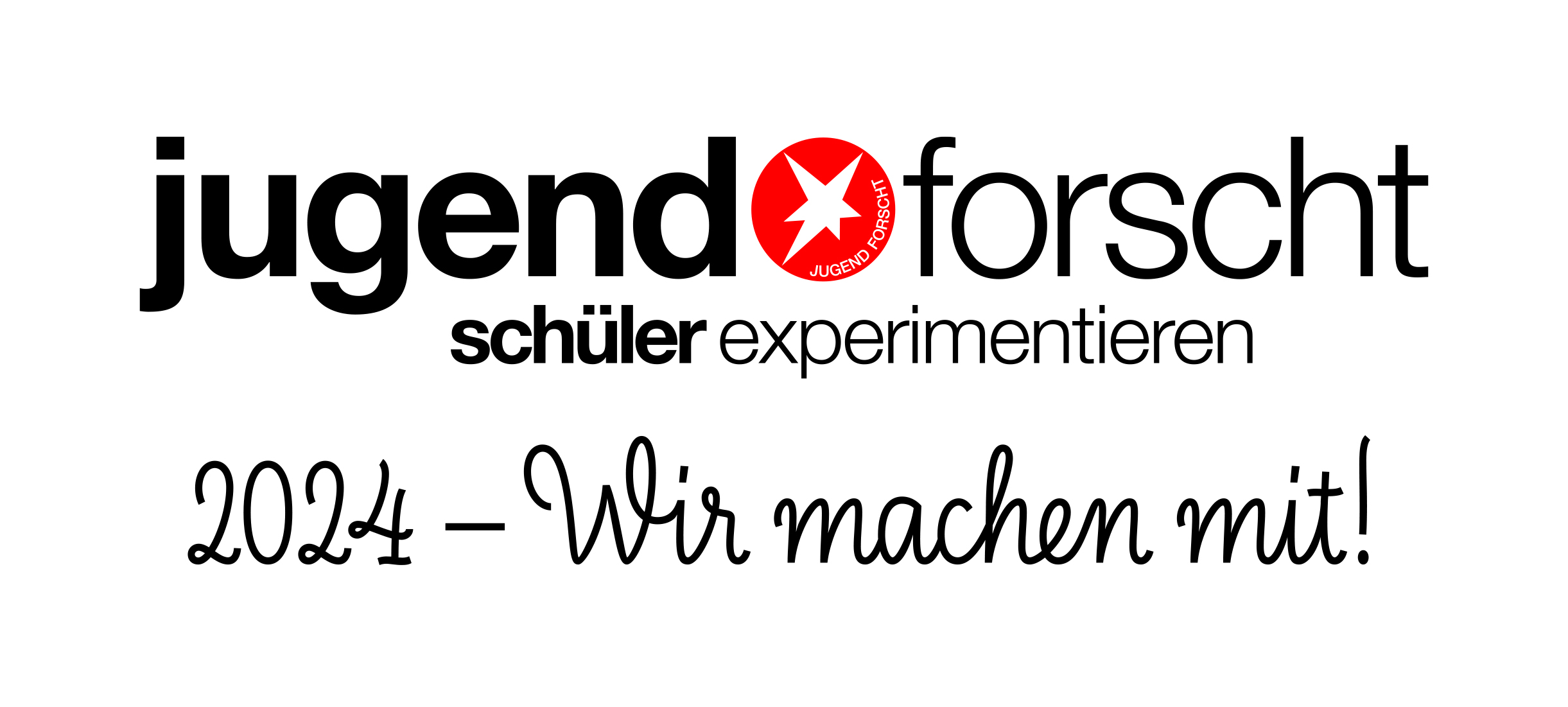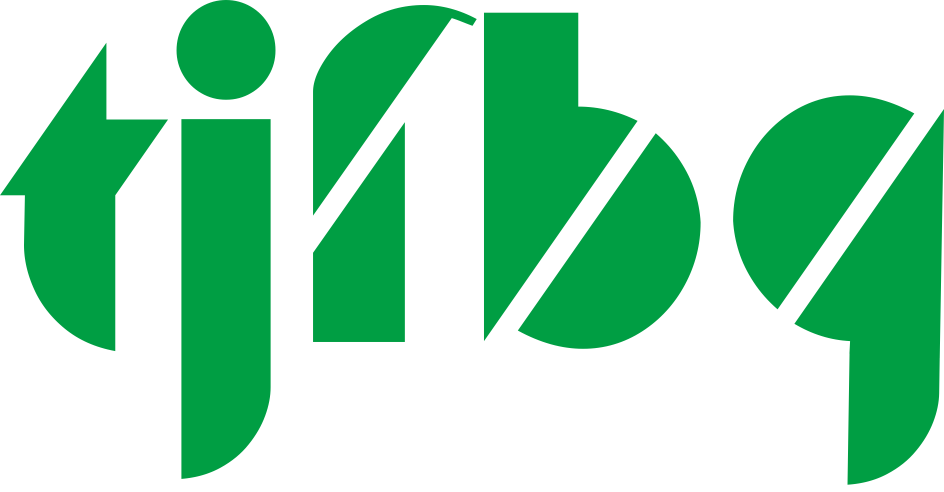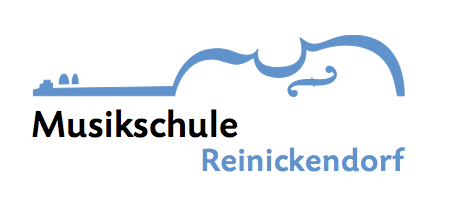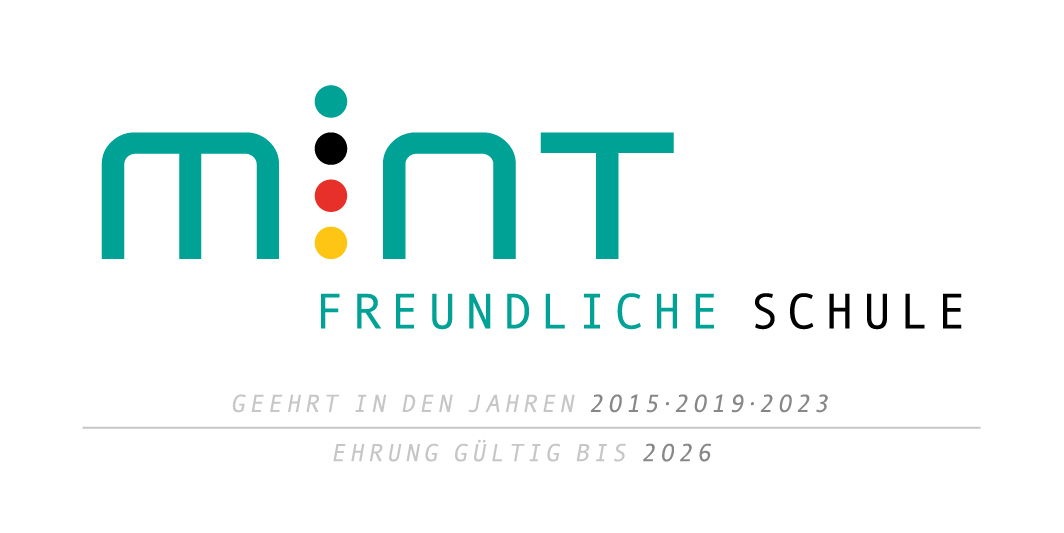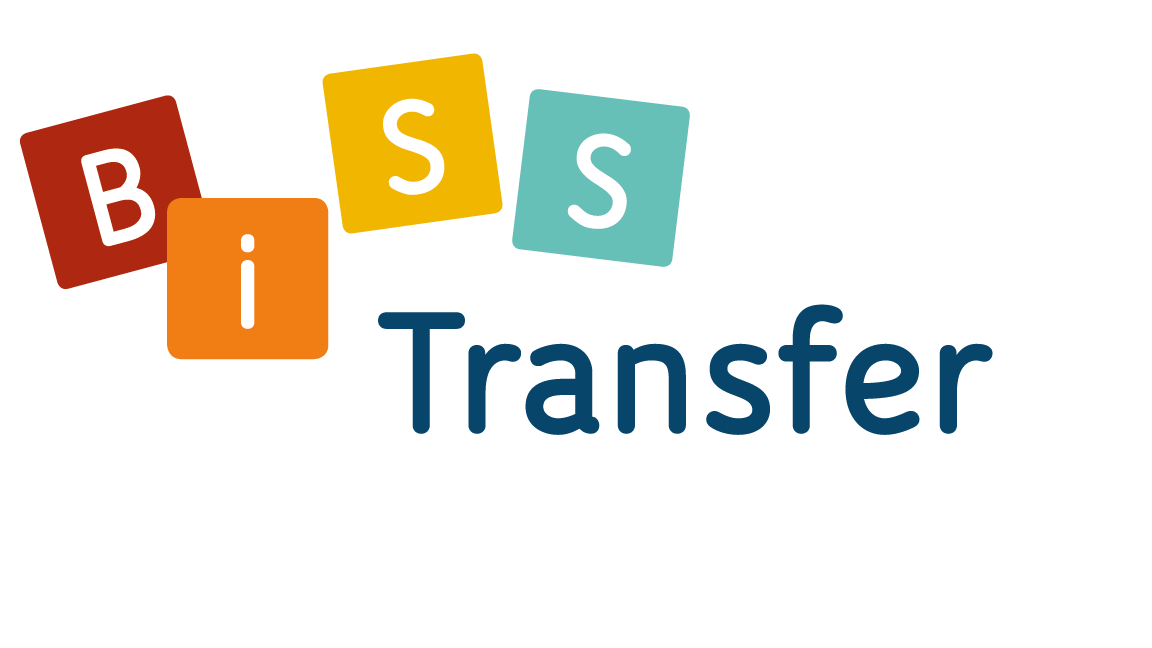HUMBATE 2024
Unser hauseigenes Debattenformat, die Humbate, die vor nunmehr ca. 9 Jahren von Jonas Mücke ins Leben gerufen wurde, war wieder ein beeindruckendes Ereignis! Unsere engagierten Schüler:innen debattierten auf einem sprachlich hohen Niveau und fanden schnell ihren Flow zu den Themen "Social media does more harm than good" und "There should be limits to free speech on social media".
Es gab flammende Opening Speeches und Closing Statements. Unter der souveränen Moderation von Erik, der als Chairperson alles unter Kontrolle hatte, wurde die Debatte lebhaft und respektvoll unter Einbezug vieler Zuschauerfragen geführt. Wieder einmal zeigten unsere Schüler:innen wie elegant, respektvoll, interaktiv und engagiert eine Debatte ablaufen kann.
Christopher behauptete sich alleine auf der Pro-Seite tapfer und gewann seine Debatte zu "There should be limits to free speech". Die erste Debatte wurde erfolgreich von Anton und Anthea gewonnen. Oliver und Paul vertraten die Pro-Seite eloquent und souverän. Federico und Elisabeth gewannen den Award für die besten Audience Questions.
Ein weiterer Höhepunkt war das tolle Finish mit dem traditionellen Motto-Humcake verziert mit tollem Social-Media-Cartoon-Motiv, sowie Blumen, Certificates und einem gemeinsamen Gruppenfoto.
Zudem wurde sowohl von Mrs. Garthwaite als auch von den Schüler:innen Werbung für den berlinweiten Debattierwettbewerb Debating Matters, der am 28.6. stattfindet, gemacht, wo sich ein Dreamteam aus Q2 und Q4 SuS für den Wettbewerb finden wird. Interessent:innen melden sich bitte bei Frau Garthwaite. Vielen Dank an Mrs. Garthwaite für die tolle Betreuung der Schüler:innen in der Vorbereitung! Herzlichen Glückwunsch an unsere Debattant:innen und die Chairperson für eine großartige Leistung!
Melina Rath für den FB Englisch
Celebrating the Dedication, Team Work and Skills of Our Students in the Debating Matters Competition
We take great pride in acknowledging the exceptional dedication and outstanding skills exhibited by our students in the Debating Matters competition at the University of Applied Sciences! Their hard work, critical thinking, and fearless participation as speakers in the debates and from the audience have been truly remarkable. Nearly all the students from our four English advanced classes came out in full force to cheer on and bolster our team. They actively engaged in the event by posing thought-provoking questions and participating wholeheartedly. The team support was truly phenomenal. We are so proud of all of you!!
This prestigious event, organized by the Ideas Matter/Debating Matters team and Freiblick Institute now at its 20th anniversary, provided a valuable platform for growth and engaging debates. We express our sincere appreciation to our teachers and mentors, esp. Mr. Mücke and Mrs. Garthwaite for their guidance and support throughout the competition. While the journey may have had its challenges, and we dropped out earlier than expected after winning the first debate, we celebrate the growth and accomplishments of our students, confident in their continued success in future endeavors.
Thank you to our wonderful students for participating and representing Humboldtschool with grace and professionalism!!
Melina Rath on behalf of the Department of English
HUMBATE 2023
Congratulations to the Humboldt Debating Team and to the outstanding speakers who captivated the audience! In this year's special hot-seat edition of the Humbate, our speakers showcased their impressive argumentative skills through four exhilarating rounds of thought-provoking debates. The collaborative engagement between our speakers and the audience created a dynamic atmosphere within our prestigious great hall, emphasizing the power of words and persuasive communication. We express our gratitude to Mrs. Garthwaite, our esteemed linguistic expert and chairperson of the event, as well as to Mr. Mücke, the visionary and mastermind behind the Humbate, whose dedication and efforts have made this event and its cherished tradition possible.
Sincerely,
Melina Rath on behalf of The English Department
... Der Fokus liegt hierbei besonders auf der Wiederholung und Vertiefung der in den ersten Lernjahren vermittelten sprachlichen Mittel und deren Verwendung in handlungsorientierten und kooperativen Lernarrangements. Außerdem soll die Text- und Methodenkompetenz so erweitert werden, dass die Schüler*innen auf die zweijährige Oberstufe gut vorbereitet sind.
Die Sekundarstufe II ist die Kür. Hier gilt es, neben den im Berliner Rahmenplan favorisierten aktuellen Themen, zunehmend auch wieder literarische Themen ins Zentrum des Unterrichts zu stellen, die in der Sek I erworbenen Fertigkeiten anzuwenden und die linguistischen Fertigkeiten der Schüler*innen stetig zu erweitern.
In allen Jahrgängen soll die Sprechkompetenz der Schüler*innen gefördert werden. Dabei kommen alltagsrelevante Sprechsituationen und interaktive Verfahren zum Einsatz, die zunächst das Ziel haben, die Sprechbereitschaft der jungen Fremdsprachenlerner*innen herzustellen. Die kommunikative mündliche Kompetenz der Schüler*innen wird zwar mit den zentralen Prüfungen im 10. Jahrgang und in der Oberstufe überprüft. Wir haben uns in Anlehnung an die zentralen Prüfungsformate vorgenommen, bereits im 8. und 9. Jahrgang mündliche Überprüfungen zu organisieren, auch um die Relevanz der Mündlichkeit zu unterstreichen. Daneben ist die Durchführung von mündlichen Sprechformaten in der Oberstufe fester Bestandteil des Fachbereichsangebots für unsere Schülerinnen und Schüler.
Der Lesekompetenz fällt eine Schlüsselrolle zu: In allen Jahrgängen setzen wir – stufenangemessen – längere Lesetexte bzw. Ganzschriften ein. Ganzschriften können das Lehrwerk phasenweise auch komplett ersetzen. Die Vermittlung basaler Erschließungsstrategien und der Einsatz (kooperativer und) handlungsorientierter Verfahren sollen die Schüler*innen in die Lage versetzen, Freude am Lesen zu entwickeln. Darüber hinaus sollen sie bewirken, dass die Lernenden über die Rezeption literarischer Texte nicht nur Einblicke in die englischsprachige Literatur gewinnen. Sie sollen auch erkennen, dass sie ihren individuellen Sprachaneignungsprozess mithilfe authentischer (literarischer) Texte (in Eigentätigkeit) deutlich beschleunigen können.
Wir sind uns darüber bewusst, dass fremdsprachliche (produktive) Fertigkeiten nicht ausschließlich im Rahmen des obligatorischen Schulunterrichts erworben werden können. Hinzu kommt, dass die zur Verfügung stehende Unterrichtszeit für die meisten Schüler*innen viel zu knapp bemessen ist, um Strukturen und Redemittel so einzuüben, dass sie jederzeit situationsadäquat abgerufen werden können. Vielmehr gehen wir davon aus, dass der Unterricht den Prozess des Fremdsprachenlernens „rahmt“, indem im Unterricht Strukturen vermittelt und geübt und Kenntnisse (Wissensbestände) vermittelt werden. Der erfolgreiche Lerner beschäftigt sich hingegen auch außerhalb des obligatorischen Klassenunterrichts mit der Sprache. Uns ist es daher ein wichtiges Anliegen, die Schüler*innen ausreichend zu motivieren, alle Lernkanäle, auch solche, die ihnen in ihrem unmittelbaren Lebensumfeld zur Verfügung stehen, insbesondere auch interaktive Medien, intensiv zu nutzen, um ihre individuellen Kompetenzstände stetig zu erweitern. Ferner sollen sie im Unterricht nachhaltige Lernstrategien kennenlernen und einüben, sodass sie – ganz im Sinne des Humboldt‘schen Bildungsideals - in die Lage versetzt werden, ihren eigenen Sprachlernprozess zunehmend eigenverantwortlich zu steuern und voranzutreiben. Es ist uns also ein wichtiges Anliegen, die LernerInnenautonomie stufenangemessen zu steigern. In diesem Zusammenhang übernimmt das Fach Englisch als erste Fremdsprache eine Servicefunktion für jene Schüler*innen, die sich im 8. Jahrgang dafür entscheiden, eine weitere Fremdsprache zu erlernen.
Toller landes- und bundesweiter Erfolg unserer Schüler*innen bei The Big Challenge
Herzlichen Glückwunsch unseren vier Berliner Landessieger*innen im diesjährigen The Big Challenge-English-Contest!!
(auf dem Foto von links nach rechts)
Samuel Linus Munser, 5h, erzielte den 1. Platz der 5. Klassen des Landes Berlin
Greta Brodkorb, 9h, erreichte den 3. Platz der 9. Klassen des Landes Berlin
Lisa Nefedov, 9g, erzielte den 1. Platz der 9. Klassen des Landes Berlin und erhält sogar einen Bundespokal für den 5. Platz auf Bundesebene!
Anastassia Ernst, 7g, erreichte auf der Landesebene Berlin den 2. Platz der 7. Klassen
(in zweiter Reihe von links nach rechts, Frau Rath, Frau Schöbel, Herr Roth, Frau Chen, Herr Kupferschmid, Foto: Frau Krause)
Wir alle gratulieren unseren vier Landessieger*innen ganz herzlich zu dieser sensationellen Leistung!!"
The Faculty of English proudly presents: The 2020 Online Science Congress
Students from six different Sixth Form classes have committed the entire third semester to ideas and innovations most urgently needed to respond to the challenges of our time. Every single one has the potential to make the world a better place.
After having selected a project, students did some thorough research into the matter before they finally designed their presentatons. In class and on exhibition day all presenters enthusiastically delivered their projects to their fellow students.
The English faculty has been conducting the Science Congresss simulation for a few years by now. In 2020 for the first time it was carried out as an online event.
Read the opening speech to this event drafted and presented by Melina Rath.
Take a look at this year's nominations and gain an insight into the wide range of ideas and innovations:
- Aquaporine provided by Chelsea, Matilda and Yin-He
- Green Estate by Clara, Isaak and Max
Book Cover Project, Lord of the Flies, Q1, October 2020, SaLzH-Week
During the digital week conducted by our school in September 2020 students from one of our Q1-English courses designed book covers for William Golding’s dystopian novel Lord of the Flies (1954).
The task was to design a cover that depicts the theme of the novel either by hand or using digital tools like the design program Canva. These covers were then uploaded to a Padlet and students were asked to comment on designs they found especially effective.
This way, the class not only translated their knowledge about the novel’s theme into a new visual medium, but also critically reflected on the ideas presented by their classmates, using and practicing English in a real and meaningful context. The results were very impressive! They demonstrate that successful learning online can be accomplished despite the many challenges that come along with it.

From top left to bottom right: Anna Galimzanow, Duha Kasem, Mia Majora, Lea Hübner, Emmanuel Grätz, Elaine Santana-Jenz
Jedem Jahrgang ist darüber hinaus ein landeskundlicher Schwerpunkt zugeordnet. Außerdem soll mit dem 7. Jahrgang aufsteigend jährlich ein Literaturmodul/ Lesemodul unterrichtet werden, auch in Verbindung mit der Vermittlung landeskundlicher (und historischer) Inhalte, auf die in späteren Jahrgängen zurückgegriffen werden kann. Außerdem weisen die Module jeweils Bezüge zu den anderen Jahrgängen aus. Sie halten zudem fest, welchen Beitrag das jeweilige Modul zur Medienbildung (ab dem 6. Jahrgang), zur interkulturellen Kompetenzentwicklung und zur Sprachlernkompetenzschulung/ zur Sprachbewusstheit leisten soll. Selbstverständlich werden alle kommunikativen Kompetenzen in allen Jahrgängen gleichermaßen gefördert. Die Module bilden jedoch explizit ab, wie die produktiven Kompetenzen der Schülerinnen und Schüler sukzessive gefördert werden sollen und welche Leistungsmessungsformate dementsprechend in den einzelnen Jahrgängen angestrebt werden.
Festzuhalten bleibt noch, dass die konkreten Inhalte - abhängig vom Kompetenzstand der Schülerinnen und Schüler, abhängig von den spezifischen Interessen der beteiligten Akteure aber auch tagesaktuellen Entwicklungen - abweichen können, sofern die sprachlichen Mittel in angelehnten inhaltlichen Kontexten adäquat vermittelt werden können.
Life after Covid 19 - Post-Covid Scenarios, Q2, May 2020
While the pandamic is still under way, governments are forced to take action. Thereby individual freedoms are being restricted and the foundations of our democracy are put under enormous pressure. For the time being, understandable and probably inevitable. But what will be the long-term effects and how will the pandamic shape our lives in the future? What will remain? Will the pandamic have a lasting effect and even lead to changes which turn out to be benefecial?
Q2 students shared their visions of the future, each of them dealing with a policy field of their choice. Read some of their comments (unabridged):
-
The Economy and supply chains by David
-
Education and schools by Livia
-
Society and innovation by Gustav
-
Teaching by Nele
-
Communication and Interaction by Elif
-
Education by Kira
Debating Matters 2018, Opening Speech (Pro 1)
“Social Media should filter out fake news stories“
Welcome Ladies and Gentlemen,
We´re here today to talk about a very controversial but important question: Should Social Media filter out fake news stories? To give you a brief insight into this topic, I´d first like to talk about fake news as well as social media separately and then get to the problems that come with the connection of the two. Afterwards I will inform you about the role of journalism in today’s society and how it is affected by fake news.
„Pope Francis Shocks World, Endorses Donald Trump for President“, „Wikileaks CONFIRMS Hillary Sold Weapons to ISIS“
These attention-grabbing headlines are some of the most-spread fake news articles that were liked, commented and shared by hundreds of thousands of people. Fake news often includes knowingly and purposely wrong, or just unverified and biased information. They are spread in order to either influence the public opinion, support or ruin a certain person or to make profit.
Fake news has been around for a long time though. Even in ancient Rome they were already spread to sabotage opposing politicians. But they never had such an extent and impact as today. So what has changed since then? Why is fake news so controversial now?
Well the answer to that can be found in the kind of media they´re spread through now.
Social media surely are a great invention. They provide friction-free conversation for millions of people all over the world. But this immense global outreach and interconnectivity also brings all kinds of responsibilities with it as nearly 62% of American adults use social media as their main source for news.
Therefore the job of social media is to provide as objective and neutral information as possible.
Now this is where fake news becomes a problem. In combination with these characteristics of social media they can influence millions of people and become a major part of shaping the public opinion, possibly manipulating political decisions.
Through fake news disbelief and distrust in all kinds of news-providing media- like mainstream journalism- has been caused. Thus, it is a serious problem to our democracy, in which everyone should have the chance to form their own opinion and make independent political decisions based on unbiased and true information.
To solve this problem of fake news and restore the trust in the media, we need journalism, that only provides us with objective and verified news.
This will once again make our democracy and political discourse stable and re-establish the neutrality and objectivity of social media.
Consequently the filtering or cleaning of social media from fake news can only be helpful and beneficial for all of us and, therefore, should be welcomed.
Thank you very much,
Viktoria Stark, Q2
1. Platz beim Debattierwettbewerb "Debating matters"
Das Humboldt-Gymnasium gewinnt zum ersten Mal beim englischen berlinweiten Debattierwettbewerb "Debating matters"!! Die Schüler der Leistungskurse Englisch haben am 27. 02. den Pokal das erste Mal nach Hause geholt. Unsere Debattanten gewannen souverän alle Runden gegen 12 Berliner Oberschulen und gingen nach einem sehr spannenden Finale als Sieger hervor!
Die internationale Jury hob besonders die Leistungen unserer Schüler in den Kategorien teamwork, line of argumentation, knowledge of the matter, passion und conversational skills hervor. Wir gratulieren unseren speakers: Lisa-Michelle Fischer, Julian Flade, Federica Ballardini, Elif Cetin, Celina Kaliman, Laurenz Schuler, Felix Breßler und Jannine Schoepf und allen anderen Unterstützern und Kollegen, die diesen sensationellen Sieg möglich gemacht haben. Congratulations!!!
Zudem hat unsere Gastschülerin Federica Ballardini auch noch den 2. Platz als beste Sprecherin des Wettbewerbs auf dem Podium und im Publikum gewonnen. Herzlichen Glückwunsch!
Die Themen können auf der Homepage von Debating matters eingesehen werden: https://debatingmatters.com/event/berlin-championship-2020/ In Kürze werden dort auch die Siegerfotos veröffentlicht. Der Wettbewerb wurde an der University of Applied Sciences Europe am Potsdamer Platz ausgetragen und gemeinsam mit dem Freiblick Institut und Debating matters London- UK organisiert und durchgeführt.
Debating Matters 2018, Opening Speech (Pro 2)
"UNIVERSAL BASIC INCOME IS NOT A SOLUTION TO OUR SOcIAL AND ECONOMIC PROBLEMS"
First, I want to greet the judges, the opposing team and of course the audience and express our gratefulness for being able to participate in this debate today, which is a great opportunity for us. I'd like to give you a deeper insight into the social and economical repercussions brought on by the UBI.
Now as Luise already mentioned there still are some open questions surrounding the whole universal basic income topic.
For instance, the exact amount of money each person will receive. There is a difference between being financially supported by the state and being able to fully cover all necessary life costs only utilizing one's basic income.
Also moral issues arise, like the fact that everyone is entitled to the exact same amount of money. For example, a single parent with two children in comparison to a single household. And will other social benefits and welfares be abolished? Or is the basic income an additional burden for the tax payer? Regarding the exact number of the regular UBI payment, if it is meant to be enough to live off, at low life standards, but still it will be really difficult if not impossible to set a universal fair amount of money to be paid.
If you just take a look at the differences of housing costs people based in big cities, like New York, London or Tokyo pay by far more rent for an apartment the same size as people living on the countryside. Hence, if it's decided that the UBI should cover housing benefit it must be so high in order to enable people living in big cities to afford a space that we highly doubt it could be covered only from taxes. That is just one aspect to look at when trying to set an equal and fair UBI and there are many more making it hard to avoid compromises. Therefore, social conflicts could arise and threaten the overall peace within the community.
You might also want to take into consideration that the UBI does not guarantee a responsible and sustainable implementation of your money, meaning basic income could still be spent on, for instance drugs, alcohol or may even be used to finance crimes. Money that some people have worked hard for.
An UBI would also cause a drastic change in the relationship of the state to its citizens, since the modern welfare state was once developed to function as an emergency backup for those citizens, but the UBI would transform it into a state of permanent dependency, financially and psychologically.
It also puts the citizens into a rather passive position, taking away their abilities to contribute actively, making them lose the feeling of affiliation.
Lastly, UBI would cause a massive increase of immigration and social disparities, causing more significant inequalities between countries.
Instead of risking a lot for such a precarious and instable system we should collectively fight for better wages and working conditions.
Louise Materne, Q2
Debating Matters 2018
“Social media sites should filter out fake news stories” (Pro 2)
After my partner already talked about fake news and social media in general, I will take a closer look at the impact that fake news has made in the 2016 Presidential Election and afterwards I will explain how Facebook helps distributing fake news. Lastly, I will talk about the reasons why social media sites need to act and how that will not interfere with our freedom of speech.
In the months leading up to the 2016 US election, fake news generated more engagement on Facebook than real news stories according to a BuzzFeed analysis. With a majority of Facebook users relying on Facebook for news coverage, we should be alarmed by this situation. Facebook had a large influence on this election, yet there is almost nothing being done against wrong stories
.Fake news stories such as the headline of the non-existing newspaper “Denver Guardian” reporting “FBI Agent suspected in Hillary email leaks found dead in apparent murder-suicide” had a huge impact on the voters.
They may not have swung the entire election, but especially the countless pro-Trump and anti-Hillary stories definitely convinced voters they were right in their choice of candidate. Moreover, this election differed from others through the validation of those untrue news by presidential candidate Donald Trump and the growing importance social media has in our society.
As they see themselves as a social network, Facebook denied being responsible for the outcome of the election, yet ignoring many factors contributing to the spreading of fake news. However, through promoting articles and monetarizing posts, Facebook has also become a media network, where engagement metrics such as likes and shares have gotten more important. This leads to people either exaggerating in their posts and headlines or to totally making up stories to receive attention and money.
After approaching this problem by firing a supposedly biased trending stories team, that was responsible for overviewing popular stories, Facebook introduced an algorithm that does not differentiate between facts and opinions and moreover mostly recommends you posts that match to the ones that you shared and therefore brings fake news to those people, who are most likely to believe them. This prevents you from seeing different sides of a story and polarizes our society more than ever.
Now you are probably wondering: “Even if it is good to stop the spreading of fake news, how will any measures taken not interfere with our freedom of speech?”
First of all, we need to consider the damages that fake news have made to our political discourse in general. With the voters being misinformed on political matters, a discourse in society and an informed decision making by the people is not possible. With that being said, one of our core principles of democracy is at stake if we do not change our interaction with news on social media.
In addition, social media networks already censor content such as pictures showing nipples or ISIS propaganda videos. So why not delete untrue stories that are not covered by our freedom of speech because they harm a politician’s reputation or do not express personal thoughts and opinions?
I am going to leave you with that question in your mind.
Thank you for listening!
Elena Oechsner, Q2

